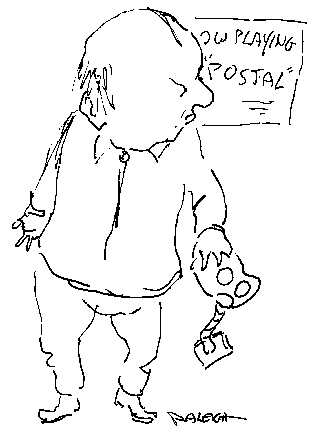 |
We'll
Still Love You, Ed Wood
By HENRY P. RALEIGH
ART TIMES October 2008
Mr.
Wood has held on to this dubious honor of worst director until very
recently — until Mr. Uwe Boll came along. Mr. Boll’s latest
movie, “Postal”, was released last May. It may be hard to find in
theaters and there are few, if any, published reviews of “Postal”.
Nonetheless, there has been much written about Mr. Boll and his
filmic oeuvre, greatly inspired by a sizable crowd of film bloggers
burning up cyberspace with demands that he cease making films immediately
and forever. The virulence with which Mr. Boll’s work is condemned
boggles the mind, his art damned as not only the very trashiest
ever produced, but the most despicable. Now there’s a win for you
considering the quantity of trashy films that have been around these
years (I don’t want to get started on Judd Apatow for that would
lead me to Adam Sandler, and he certainly makes a lot of money,
too.
If
Ed Wood must cede his crown as the worst director in film history,
it is only because he is the victim of a changing time. Woods’ films
were all made in the 50’s, a simpler and more innocent era in the
film business. The term ‘camp’ wasn’t in common currency then; very
shortly Susan Sontag would provide the definitive meaning: any overly
ambitious though well-intended, affective, pretentious, extravagant
flop — yet rather lovable for its total failure. You don’t
hear this useful dual-purpose noun/adjective any more, maybe since
everything in our culture world today has become so camp that we
can’t single out and identify camp’s special characteristics. “Plan
9 From Outer Space” is all camp — a serious harebrained plot,
eagerly amateurish acting, ridiculously inept effects, clumsy editing
and completely barren of any self-reflective sense of parody or
satire. Ed Wood himself was camp; at least as he is portrayed by
Johnny Depp in Tim Burton’s film, “Ed Wood”, a man/child obsessed
with the movies, given to manic inspirations, and quite unaware
of his lack of talent. Long before it became a sarcastic commonplace
in art discourse, Wood’s film gave substance to the phrase ‘it’s
so bad it’s good’. Even David Thomson, not a critic to suffer fools
gladly, has begrudging praise for Wood’s genuine and honest enthusiasm,
suggesting that he is ‘close to genius in disguise’.
So
why isn’t Uwe Boll benefiting from this inverse aesthetics? Is it
really possible now that something can be so bad it’s actually bad,
that it can be roundly maligned, trampled, banished from view? That
wouldn’t be good news for a host of contemporary artists. I must
confess I’ve seen only one of Mr. Boll’s films, the 2005 “Alone
in the Dark” and suffered through most of it mainly at my astonishment
at seeing Christian Slater in the lead. Film actors, like some politicians,
I suppose, do silly things as their careers are fading. Yet, I ask
you, can Mr. Boll’s films be any bloodier, grosser, more obscene,
more colossally tasteless than any of the usual run of bloody, gross,
obscene, tasteless films we have become accustomed to? If Mr. Boll
can, in fact, exceed these standards then shouldn’t he be lauded
instead of loathed? Hasn’t he advanced film to new heights of trash
and ushered in a bright milieu of film appreciation where film,
as well as a few other things, you can bet, can be so bad it’s
really bad and that’s a good? Maybe we’re not there yet but close, I figure, thanks to Mr. Boll.
Ed Wood’s “Plan 9 From Outer Space” was once made into a computer game;
Uwe Boll’s films are based, as he claims, on video games. Isn’t
there some inexorable logic in this? Doesn’t it point to the possible
re-cycling of trash films into video games, the video games giving
birth to further trash films, and so on ad infinitum, each
cycle striving for greater levels of awfulness? Something like this
has been going on with comic books to film and back to comic books.
There might someday be a special Oscar for this — it’s something
to think about, all right.
